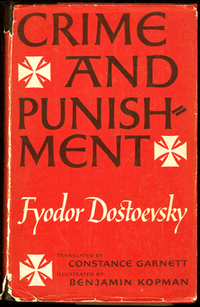Crime and Punishment

1956 Random House printing of Crime and Punishment, translated by Constance Garnett
|
|
| Author | Fyodor Dostoyevsky |
|---|---|
| Original title | Преступление и наказание |
| Language | Russian |
| Genre |
Philosophical novel Psychological novel |
| Publisher | The Russian Messenger (series) |
|
Publication date
|
1866; separate edition 1867 |
| OCLC | 26399697 |
| 891.73/3 20 | |
| LC Class | PG3326 .P7 1993 |
Crime and Punishment (Russian: и , tr. Prestupleniye i nakazaniye; IPA: [prʲɪstʊˈplʲenʲɪje ɪ nəkɐˈzanʲɪje]) is a novel by the Russian author Fyodor Dostoyevsky. It was first published in the literary journal The Russian Messenger in twelve monthly installments during 1866. It was later published in a single volume. It is the second of Dostoyevsky's full-length novels following his return from 10 years of exile in Siberia. Crime and Punishment is considered the first great novel of his "mature" period of writing.
Crime and Punishment focuses on the mental anguish and moral dilemmas of Rodion Raskolnikov, an impoverished ex-student in Saint Petersburg who formulates and executes a plan to kill an unscrupulous pawnbroker for her cash. Raskolnikov, in attempts to defend his actions, argues that with the pawnbroker's money he can perform good deeds to counterbalance the crime, while ridding the world of a vermin. He also commits the murder to test a theory of his that dictates some people are naturally capable of such actions, and even have the right to perform them. Several times throughout the novel, Raskolnikov compares himself with Napoleon Bonaparte and shares his belief that murder is permissible in pursuit of a higher purpose.
Dostoyevsky conceived the idea of Crime and Punishment in the summer of 1865. At the time the author owed large sums of money to creditors, and was trying to help the family of his brother Mikhail, who had died in early 1864. Projected under the title The Drunkards, it was to deal "with the present question of drunkness ... [in] all its ramifications, especially the picture of a family and the bringing up of children in these circumstances, etc., etc." Once Dostoyevsky conceived Raskolnikov and his crime, now inspired by the case of Pierre François Lacenaire, this theme became ancillary, centering on the story of the Marmeladov family.
...
Wikipedia
